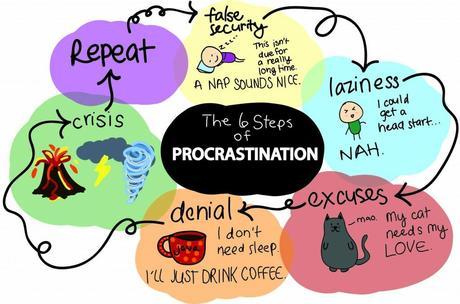It’s now about 6 years since I first read “Screw It, Let’s Do It” by Richard Branson. It’s like a number of autobiographies I’ve read, very empowering – its a story which gives you the drive to know you can achieve. Earlier this year I read “Jab, Jab, Jab” by Gary Vaynerchuck – another empowering book.
For a while I’ve listened to the “smart passive income podcast“, hosted by Pat Flynn – a truly empowering podcast and regular listen. I spoke about some of the above in a recent article about why I have an advantage over you.
If you’d like to support SEO Andy and help maintain this free resource for other businesses, please scroll to the bottom of this post where you will find links to the books mentioned in this post. If you buy one we get a few pence to keep the site up and running. Thank You.
You Just Dilly Dally All Day Long!
For someone who helps run a business and keep it afloat you do a lot of “Dilly Dallying”, a lot of stuff that isn’t going to help grow your business in the short or long term. Stop Doing That! Don’t you want to make your business grow and flourish? Don’t you want to get out of answer 130 emails a day and get out there and make a real difference to your business? So what is stopping you? I wrote an article recently about taking action to improve your business and your life, its only 100 words, have a read – it’s had superb feedback.

The Procrastination Cycle – src BearingNews j.mp/unstoppablecycle
5 Ways To Stop Your Dilly Dallying
- Schedule In Small Time Blocks
I am guilty as charges as struggling with this piece of advice, but when I do it – it works. When I see others do it, it works – so “just do it”.Instead of spending “a week” on a project, break it down into small chunks. So spend an hour doing planning, and then assign an hour to other tasks, or 30 minutes etc – don’t schedule more than 2 hours for any task. This gives you a mini-deadline to hit, for which you will feel awesome, and it gives you self-permission to focus on that task and that alone.
As Head of Digital Marketing at RedStar, I juggle so many tasks that it all seems to feel like one big block with huge targets forever away (a few weeks in reality). To me if I don’t plan that into my strategy I will get to the week of the deadline having not done much and feel like I’ve achieved nothing yet. But with small deadlines I feel good and empowered to continue.
My number one tip to anyone who gets a big chunk of emails is to set aside an hour a day for that. Just 1 hour! Split into 15 minutes chunks for me, though could be an hour in the morning. After that its only the most necessary of emails that will get a reply until the next day – anything urgent or deadline focused deal with – everything else can wait until tomorrow. Just Do It!
- Set Deadlines – Realistic Ones!
Above I talk about cutting down your deadlines into smaller deadlines. This way you and others see progress. At the end you want to meet the “real” deadline, but nothing is worse than that feeling the day before a deadline and feeling like you still have everything to do.In thinking about the above scheduling method, create a 5 hours work day where you will get “real work” done – for example web development and coding. In that 5 hours split it down into managable tasks, be realistic about how long things take with varying complexity and then add an extra task in – just to give you some drive to do more.
If that one task at the end is completed, reward yourself – Just Do It – have a nice meal, treat yourself to a pint or go for a massage (like I do).
- Challenge Yourself Regularly
There is nothing worse than doing the same things day after day, I know – I work in an industry that can be glaring at analytics for days, renewing meta tags and planning & more planning. It can and does get boring sometimes – thats when you need to do something “abnormal” outside of the box and challenge yourself.For example at RedStar, I very occasionally will take on some ‘small scale’ web development work. It maybe a complete project, or it could be a bit of a larger project. But either way its something different something new and something that gives me a chance to ensure my skills in a different area aren’t going to disappear. I am not a web developer, although my web journey began with building websites, I (today) would never suggest I was, but I can code and I know good semantic code – something I look for as part of technical seo work for all clients I work with. So that 2 or 3 days gives me a bit of a break, challenges my brain in a new way and means that I don’t get bored of spreadsheets with millions of data-points that require so much focus to understand you quickly get tired!
So… Just Do It – challenge yourself at work. Note: don’t go mad, challenge yourself to something new, but not so new it is scary!
- Get a Buddy System
You know how you are answerable to the boss, even if that is yourself sometimes… Well what if I told you that you will avoid giving real answers to them, in some cases. It’s true, no one wants to give their boss some bad news or let them know something isn’t going to plan – even though honesty is the best strategy.How about I tell you a secret I have… It’s called the “buddy system”. It basically a person who is trusted and is a sounding board. It’s someone that you get on with and can have a laugh with and know that even if you admit a screw up they aren’t going to shout at you or tell someone else about it – but instead let you talk out your problems and give you potential solutions or help you refine a solution to meet the needs. It is a person you can ask questions of “what do you think of changing this service to be this?” or as can be more often the case “I’m really struggling with the work load, what can i do?” – no body said you will get the answer you want, and no body is saying that it will solve an issue, but at least for me (and others I am the buddy of) it helps to relieve stress somewhat and it really is true, a problem shared is a problem halved.Get a buddy – Just Do It
Who should your buddy be? This is tricky, it can be someone where you work – but often its better to have an outsiders view on things. Maybe you’ve a friend who works in the same area as you and you can meet at lunch for a coffee, or maybe you know someone online more than in real life and you are great friends – they too can be just as good of a buddy as someone you can sit down with. The important thing is that you get on with them and want to help each other.
- Let Others Know Your Goals
A big part of the learning curve to being productive over the past 7 years (or so) has been to let others know what my goals are for a day or week or month. So this isn’t just setting KPI’s with clients – that stuff everyone does and ok you are accountable but only to the extent you challenge yourself to be. More of what I am talking about is an OKR system, the most famous is the one used by Google!What is an OKR? – put simply an OKR (Objectives & Key Results) is about setting ambitious targets, an objective, and getting measurable Key Results. The aim is to be ambitious, targeting for example 40% division growth for a year and measuring that using metrics such as Site Traffic, Brand Engagement and (of course) Web Conversions. The Key Results are then used in a formula with the overall target to give you a score between 0 and 1 – the “sweet spot” is about .6 or .7 as this indicates good growth (keep your Objective), .8 and .9 are bang on target growth (you should extend your objectives hugely) and 1 is that you’ve massively exceeded your Objectives.
Why OKR’s Make A Difference – OKR’s are “public” in the main, this means that those in your division (or full company for small agencies) should know what your main Objective is and how you are measuring your Key Results. Being public like this means you are accountable, it gives you a good goal to attack – and usually a company will offer a reward of some kind if you hit .7 or more for an OKR, it can be anything from a bottle of wine to a pay rise depending on which OKR you achieve (business division growth over a year may be a pay rise, increase customer engagement over a month maybe a bottle of wine). So what are you waiting for?
Just Do It! Set some OKR’s today.You work alone you say? That is no excuse for not setting an OKR, you have friends and family, or even a buddy
– use them as your “public” and make it happen, be accountable and you will grow. If you don’t want to do that, you could go really public and set huge targets – like i do once a year with a birthday update for SEOAndy! Most things I say there are never achieved but it gives me something to aim for and a target for growth, the growth has never failed yet.In a Start Up and want to introduce OKR’s FirstRound tell you how.
But is Procrastination All Bad?
Above I make the assumption that procrastination simply “gets in the way” of being productive, and to someone like me who has rigid “working blocks” procrastination really can be the devil itself. But for many it’s actually fairly productive to procrastinate a little, some studies revealed that if your working pattern is within a certain pattern then actually having 10 minutes on Facebook (or something similar) every few hours is just as good of a break as making a cup of coffee for your and your colleagues or indeed going for a walk around the block. Little breaks are indeed proven to help you work more efficiently.
If you want to read more about how Procrastination can be good for you, check out this article on FastCompany.com
Whats Your View on Procrastination?
As I have just mentioned to me procrastination simply gets in the way of being able to do my work, but what do you think? Do you procrastinate too much? Or do you think that you should do it more often?

